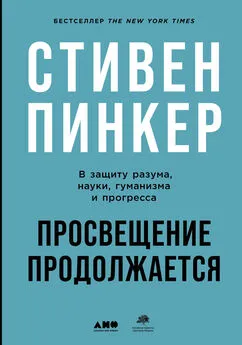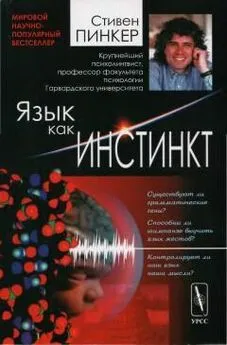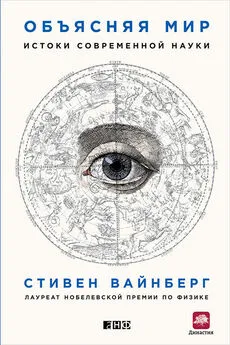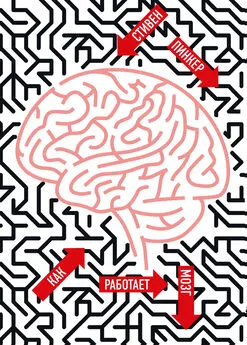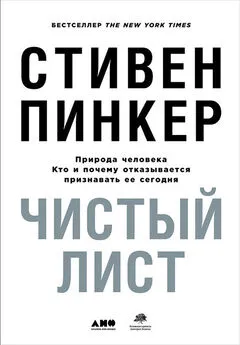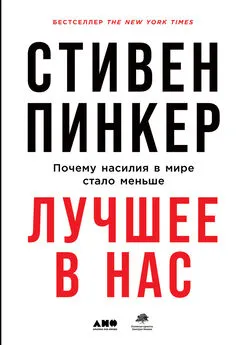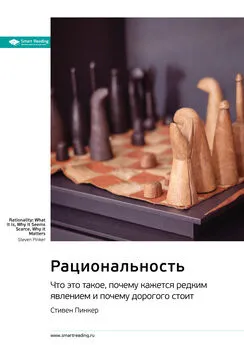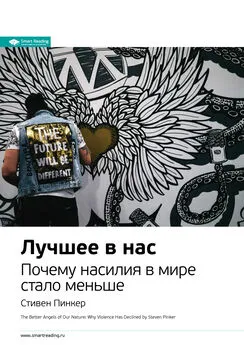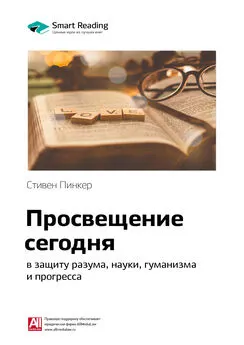Стивен Пинкер - Просвещение продолжается. В защиту разума, науки, гуманизма и прогресса
- Название:Просвещение продолжается. В защиту разума, науки, гуманизма и прогресса
- Автор:
- Жанр:
- Издательство:Альпина нон-фикшн
- Год:2021
- Город:Москва
- ISBN:9785001395362
- Рейтинг:
- Избранное:Добавить в избранное
-
Отзывы:
-
Ваша оценка:
Стивен Пинкер - Просвещение продолжается. В защиту разума, науки, гуманизма и прогресса краткое содержание
Этот прогресс – не случайность и не результат действия внешних сил. Это дар современному миру от деятелей Просвещения, которые первыми додумались, что знания можно использовать во имя процветания всего человечества. Идеи Просвещения – вовсе не наивные мечтания. Наоборот, они сработали – и это неоспоримый факт. Тем не менее именно сейчас эти идеи особенно нуждаются в нашей защите, поскольку противостоят характерным недостаткам человеческой природы – трайбализму, авторитаризму, демонизации чужаков и магическому мышлению, – которые так нравится эксплуатировать современным демагогам. Да, стоящие перед человечеством проблемы огромны, но все они решаемы, если мы, продолжая дело Просвещения, используем для этого разум, доверяем науке и руководствуемся идеалами гуманизма.
Особенности
Более 70 графиков из почти всех областей человеческой жизни.
Для кого
Для поклонников Стивена Пинкера. Для всех, кто интересуется природой человека. Для тех, кто верит в прогресс, и для тех, кто в нем сомневается.
Просвещение продолжается. В защиту разума, науки, гуманизма и прогресса - читать онлайн бесплатно ознакомительный отрывок
Интервал:
Закладка:
Kahan, D. M., Jenkins-Smith, H., Tarantola, T., Silva, C. L., & Braman, D. 2012. Geoengineering and climate change polarization: Testing a two-channel model of science communication. Annals of the American Academy of Political and Social Science, 658 , 193–222.
Kahan, D. M., Peters, E., Dawson, E. C., & Slovic, P. 2013. Motivated numeracy and enlightened self-government. https://papers.ssrn.com/sol3/papers.cfm?abstract_id=2319992.
Kahan, D. M., Peters, E., Wittlin, M., Slovic, P., Ouellette, L. L., et al. 2012. The polarizing impact of science literacy and numeracy on perceived climate change risks. Nature Climate Change, 2, 732–35.
Kahan, D. M., Wittlin, M., Peters, E., Slovic, P., Ouellette, L. L., et al. 2011. The tragedy of the risk-perception commons: Culture conflict, rationality conflict, and climate change. Cultural Cognition Working Paper 89. https://papers.ssrn.com/sol3/papers.cfm?abstract_id=1871503.
Kahneman, D. 2011. Thinking, fast and slow . New York: Farrar, Straus & Giroux.
Kahneman, D., Krueger, A., Schkade, D., Schwarz, N., & Stone, A. 2004. A survey method for characterizing daily life experience: The day reconstruction method. Science, 3, 1776–80.
Kanazawa, S. 2010. Why liberals and atheists are more intelligent. Social Psychology Quarterly, 73, 33–57.
Kane, T. 2016. Piketty’s crumbs. Commentary, April 14.
Kant, I. 1784/1991. An answer to the question: What is enlightenment? London: Penguin.
Kant, I. 1795/1983. Perpetual peace: A philosophical sketch. In I. Kant, Perpetual peace and other essays . Indianapolis: Hackett. http://www.mtholyoke.edu/acad/intrel/kant/kant1.htm.
Kasturiratne, A., Wickremasinghe, A. R., de Silva, N., Gunawardena, N. K., Pathmeswaran, A., et al. 2008. The global burden of snakebite: A literature analysis and modelling based on regional estimates of envenoming and deaths. PLOS Medicine, 5 .
Keith, D. 2013. A case for climate engineering . Boston: Boston Review Books.
Keith, D. 2015. Patient geoengineering. Paper presented at the Seminars About Long-Term Thinking, San Francisco. http://longnow.org/seminars/02015/feb/17/patient-geoengineering/.
Keith, D., Weisenstein, D., Dykema, J., & Keutsch, F. 2016. Stratospheric solar geoengineering without ozone loss. Proceedings of the National Academy of Sciences, 113, 14910–14.
Kelley, J., & Evans, M. D. R. 2016. Societal income inequality and individual subjective well-being: Results from 68 societies and over 200,000 individuals, 1981–2008. Social Science Research, 62, 1–23.
Kelly, K. 2010. What technology wants . New York: Penguin.
Kelly, K. 2013. Myth of the lone villain. The Technium . http://kk.org/thetechnium/myth-of-the-lon/.
Kelly, K. 2016. The inevitable: Understanding the 12 technological forces that will shape our future . New York: Viking.
Kelly, K. 2017. The AI cargo cult: The myth of a superhuman AI. Wired . https://www.wired.com/2017/04/the-myth-of-a-superhuman-ai/.
Kennedy, D. 2011. Don’t shoot: One man, a street fellowship, and the end of violence in inner-city America . New York: Bloomsbury.
Kenny, C. 2011. Getting better: How global development is succeeding – and how we can improve the world even more . New York: Basic Books.
Kessler, R. C., Berglund, P., Demler, O., Jin, R., Koretz, D., et al. 2003. The epidemiology of major de-pressive disorder: Results from the National Comorbidity Survey Replication (NCS-R). Journal of the American Medical Association, 289, 3095–3105.
Kessler, R. C., Berglund, P., Demler, O., Jin, R., Merikangas, K. R., et al. 2005. Lifetime prevalence and age-of-onset distributions of DSM-IV disorders in the National Comorbidity Survey Replication. Archives of General Psychiatry, 62, 593–602.
Kevles, D. J. 1985. In the name of eugenics: Genetics and the uses of human heredity . Cambridge, MA: Harvard University Press.
Kharecha, P. A., & Hansen, J. E. 2013. Prevented mortality and greenhouse gas emissions from his historical and projected nuclear power. Environmental Science & Technology, 47, 4889–95.
Kharrazi, R. J., Nash, D., & Mielenz, T. J. 2015. Increasing trend of fatal falls in older adults in the United States, 1992 to 2015: Coding practice or recording quality? Journal of the American Geri-atrics Society, 63, 1913–17.
Kim, J., Smith, T. W., & Kang, J.-H. 2015. Religious affiliation, religious service attendance, and mortality. Journal of Religion and Health, 54, 2052–72.
King, D., Schrag, D., Dadi, Z., Ye, Q., & Ghosh, A. 2015. Climate change: A risk assessment . Cambridge, UK: University of Cambridge Center for Science and Policy.
Kitcher, P. 1990. Kant’s transcendental psychology . New York: Oxford University Press.
Klein, D. B., & Buturovic, Z. 2011. Economic enlightenment revisited: New results again find little relationship between education and economic enlightenment but vitiate prior evidence of the left being worse. Economic Journal Watch, 8, 157–73.
Klitzman, R. L. 2015. The ethics police? The struggle to make human research safe . New York: Oxford University Press.
Kochanek, K. D., Murphy, S. L., Xu, J., & Tejada-Vera, B. 2016. Deaths: Final data for 2014. National Vital Statistics Reports, 65 (4). http://www.cdc.gov/nchs/data/nvsr/nvsr65/nvsr65/04.pdf.
Kohut, A., Taylor, P. J., Keeter, S., Doherty, C., Dimock, M., et al. 2011. The generation gap and the 2012 election . Washington: Pew Research Center. http://www.people-press.org/files/legacy-pdf/11-3-11%20Generations%20Release.pdf.
Kolosh, K. 2014. Injury facts statistical highlights. http://www.nsc.org/SafeCommunitiesDocuments/Conference-2014/Injuryacts-Statistical-Analysis-Kolosh.pdf.
Koningstein, R., & Fork, D. 2014. What it would really take to reverse climate change. IEEE Spectrum . http://spectrum.ieee.org/energy/renewables/what-it-would-really-take-to-reverse-climate-change.
Kräenbring, J., Monzon Penza, T., Gutmann, J., Muehlich, S., Zolk, O., et al. 2014. Accuracy and completeness of drug information in Wikipedia: A comparison with standard textbooks of pharmacology. PLOS ONE, 9, e106930.
Krauss, L. M. 2012. A universe from nothing: Why there is something rather than nothing . New York: Free Press.
Krisch, M., Eisner, M., Mikton, C., & Butchart, A., eds. 2015. Global strategies to reduce violence by 50 % in 30 years: Findings from the WHO and University of Cambridge Global Violence Reduction Conference 2014 . Cambridge, UK: Institute of Criminology, University of Cambridge.
Kristensen, H. M. 2016. U.S. nuclear stockpile numbers published enroute to Hiroshima. Federation of American Scientists Strategic Security Blog . https://fas.org/blogs/security/2016/05/hiroshima-stockpile/.
Kristensen, H. M., & Norris, R. S. 2016a. Status of world nuclear forces. Federation of American Scientists . https://fas.org/issues/nuclear-weapons/status-world-nuclear-forces/.
Kristensen, H. M., & Norris, R. S. 2016b. United States nuclear forces, 2016. Bulletin of the Atomic Scientists, 72, 63–73.
Krug, E. G., Dahlberg, L. L., Mercy, J. A., Zwi, A. B., & Lozano, R., eds. 2002. World report on violence and health . Geneva: World Health Organization.
Kuhn, D. 1991. The skills of argument . New York: Cambridge University Press.
Kuncel, N. R., Klieger, D. K., Connelly, B. S., & Ones, D. S. 2013. Mechanical versus clinical data combination in selection and admissions decisions: A meta-analysis. Journal of Applied Psychology, 98, 1060–72.
Kunda, Z. 1990. The case for motivated reasoning. Psychological Bulletin, 108, 480–98.
Kuran, T. 2010. Why the Middle East is economically underdeveloped: Historical mechanisms of institutional stagnation. Journal of Economic Perspectives, 18, 71–90.
Kurlansky, M. 2006. Nonviolence: Twenty ve lessons from the history of a dangerous idea . New York: Modern Library.
Kurzban, R., Tooby, J., & Cosmides, L. 2001. Can race be erased? Coalitional computation and social categorization. Proceedings of the National Academy of Sciences, 98, 15387–92.
Kuznets, S. 1955. Economic growth and income inequality. American Economic Review, 45, 1–28.
Lacina, B. 2006. Explaining the severity of civil wars. Journal of Conflict Resolution, 50, 276–89.
Lacina, B., & Gleditsch, N. P. 2005. Monitoring trends in global combat: A new dataset in battle deaths. European Journal of Population, 21, 145–66.
Lake, B. M., Ullman, T. D., Tenenbaum, J. B., & Gershman, S. J. 2017. Building machines that learn and think like people. Behavioral and Brain Sciences, 39, 1–101.
Lakner, M., & Milanović, B. 2015. Global income distribution: From the fall of the Berlin Wall to the Great Recession. World Bank Economic Review, 1–30.
Lampert, L. 1996. Leo Strauss and Nietzsche . Chicago: University of Chicago Press.
Lancet Infectious Diseases Editors. 2005. Clearing the myths of time: Tuskegee revisited. The Lancet Infectious Diseases, 5, 127.
Land, K. C., Michalos, A. C., & Sirgy, J., eds. 2012. Handbook of social indicators and quality of life research . New York: Springer.
Lane, N. 2015. The vital question: Energy, evolution, and the origins of complex life . New York: Norton.
Lanier, J. 2014. The myth of AI. Edge . https://www.edge.org/conversation/jaron_lanier-the-myth-of-ai.
Lankford, A. 2013. The myth of martyrdom . New York: Palgrave Macmillan.
Lankford, A., & Madfis, E. 2018. Don’t name them, don’t show them, but report every thing else: A pragmatic proposal for denying mass shooters the attention they seek and deterring future offenders. American Behavioral Scientist .
Latzer, B. 2016. The rise and fall of violent crime in America . New York: Encounter Books.
Laudan, R. 2016. Was the agricultural revolution a terrible mistake? Not if you take food processing into account. http://www.rachellaudan.com/2016/01/was-the-agricultural-revolution-a-terrible-mistake.html.
Law, S. 2011. Humanism: A very short introduction . New York: Oxford University Press.
Lawson, S. 2013. Beyond cyber oom: Cyberattack scenarios and the evidence of history. Journal of Information Technology & Politics, 10, 86–103.
Layard, R. 2005. Happiness: Lessons from a new science . New York: Penguin.
Le Quéré, C., Andrew, R. M., Canadell, J. G., Sitch, S., Korsbakken, J. I., et al. 2016. Global carbon budget 2016. Earth System Science Data, 8, 605–49.
Leavis, F. R. 1962/2013. The two cultures? The significance of C. P. Snow . New York: Cambridge University Press.
Lee, J.-W., & Lee, H. 2016. Human capital in the long run. Journal of Development Economics, 122, 147–69.
Leetaru, K. 2011. Culturomics 2.0: Forecasting large cale human behavior using global news media tone in time and space. First Monday, 16 (9). http://firstmonday.org/article/view/3663/3040.
Leon, C. B. 2016. The life of American workers in 1915. Monthly Labor Review . http://www.bls.gov/opub/mlr/2016/article/the-life-of-american-workers-in-1915.htm.
Leonard, T. C. 2009. Origins of the myth of social Darwinism: The ambiguous legacy of Richard Hofstadter’s “Social Darwinism in American thought.” Journal of Economic Behavior & Organi-zation, 71, 37–51.
Читать дальшеИнтервал:
Закладка:
